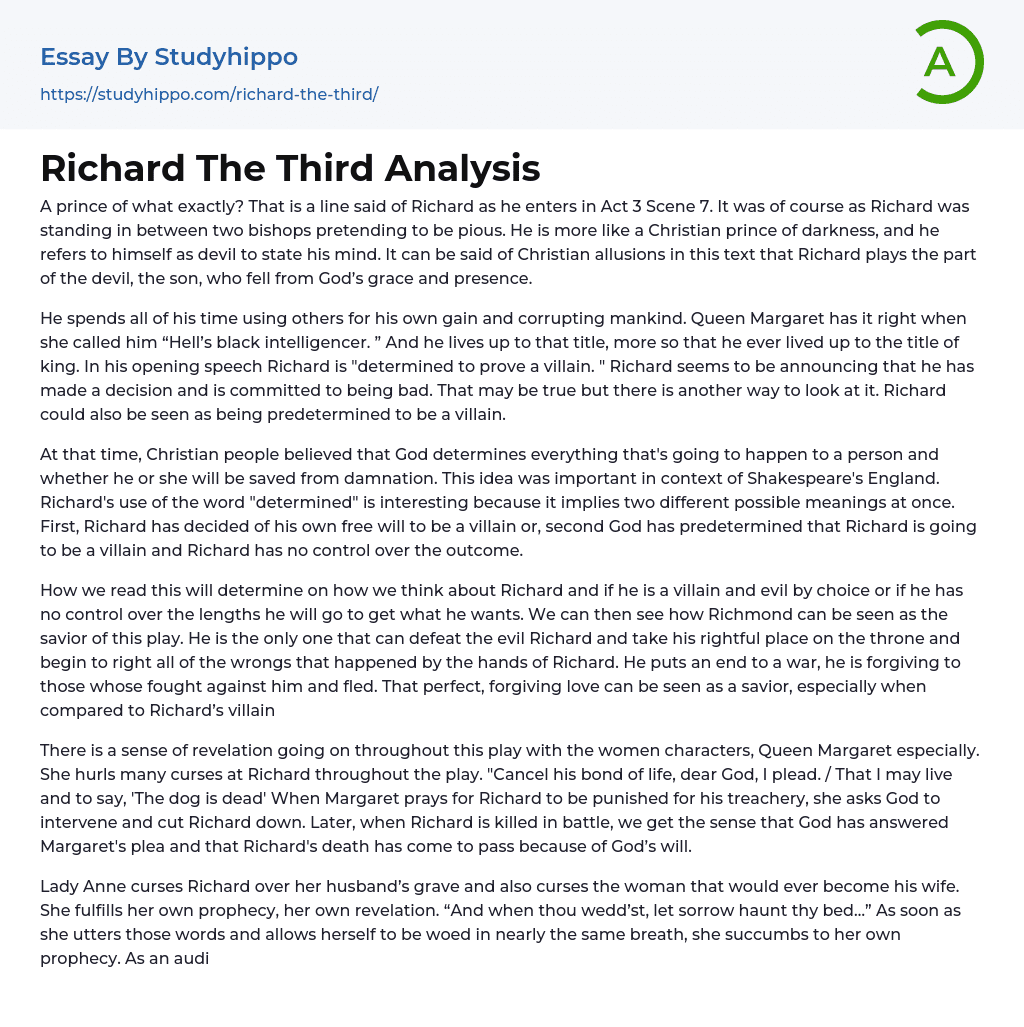A prince of what exactly? That is a line said of Richard as he enters in Act 3 Scene 7. It was of course as Richard was standing in between two bishops pretending to be pious. He is more like a Christian prince of darkness, and he refers to himself as devil to state his mind. It can be said of Christian allusions in this text that Richard plays the part of the devil, the son, who fell from God’s grace and presence.
He spends all of his time using others for his own gain and corrupting mankind. Queen Margaret has it right when she called him “Hell’s black intelligencer. ” And he lives up to that title, more so that he ever lived up to the title of king. In his opening speech Richard is "determined to prove a villain. " Richard seems to
...be announcing that he has made a decision and is committed to being bad. That may be true but there is another way to look at it. Richard could also be seen as being predetermined to be a villain.
At that time, Christian people believed that God determines everything that's going to happen to a person and whether he or she will be saved from damnation. This idea was important in context of Shakespeare's England. Richard's use of the word "determined" is interesting because it implies two different possible meanings at once. First, Richard has decided of his own free will to be a villain or, second God has predetermined that Richard is going to be a villain and Richard has no control over the outcome.
Ho
we read this will determine on how we think about Richard and if he is a villain and evil by choice or if he has no control over the lengths he will go to get what he wants. We can then see how Richmond can be seen as the savior of this play. He is the only one that can defeat the evil Richard and take his rightful place on the throne and begin to right all of the wrongs that happened by the hands of Richard. He puts an end to a war, he is forgiving to those whose fought against him and fled. That perfect, forgiving love can be seen as a savior, especially when compared to Richard’s villain
There is a sense of revelation going on throughout this play with the women characters, Queen Margaret especially. She hurls many curses at Richard throughout the play. "Cancel his bond of life, dear God, I plead. / That I may live and to say, 'The dog is dead' When Margaret prays for Richard to be punished for his treachery, she asks God to intervene and cut Richard down. Later, when Richard is killed in battle, we get the sense that God has answered Margaret's plea and that Richard's death has come to pass because of God’s will.
Lady Anne curses Richard over her husband’s grave and also curses the woman that would ever become his wife. She fulfills her own prophecy, her own revelation. “And when thou wedd’st, let sorrow haunt thy bed…” As soon as she utters those words and allows herself to be woed in nearly the same breath, she
succumbs to her own prophecy. As an audience, we know to take the curses, the prophecies seriously, because they all come to pass. Some of the characters seem to take them seriously, as in Christian traditions, and some do not and see them simply as mutterings from mad people, women specifically.
Another allusion that can be seen in the text is how characters have a major part in their own destruction. They seem to be choosing the evil, the wrong despite the outcome, which will inevitably lead to their demise. Lady Anne and others are taken in by Richard’s charm and charisma and wit and choose not to see the evil and overlook the violence. In Christian religion, that is exactly how the devil works. “O that cunning plan of the evil one. O the vainness, and the frailties, and the foolishness of men! How quick the characters are to recognize evil when they see it but are unable to resist being caught up in that same evil. That same relationship can almost be seen with the audience. We are so taken in my Richard’s presence that we find ourselves almost rooting for him, despite being shocked by him. That is how temptation seems to work. We are repulsed by something at first, can’t even imagine being involved in any way, and over time that same thing can become less repulsive and more intriguing.
That fine line between falling into temptation and standing strong is even finer in this play, which rings true in real life. Good and evil, right and wrong, these are universal Christian ideals. And when evil looks so good,
sounds so convincing, it is hard to say no even when we know it is wrong. That eternal struggle runs throughout this play and into everyday life, which is why it was so popular when it was first performed and why it is still popular today.
- Adam And Eve essays
- Baptism essays
- Catholic Church essays
- Christian essays
- Church essays
- Crucifixion Of Jesus essays
- Crusades essays
- Elizabeth essays
- Eucharist essays
- God The Father essays
- Holy Spirit essays
- Jesus Christ essays
- Lord essays
- Pope essays
- Priest essays
- Protestant Reformation essays
- Protestantism essays
- Sacrament essays




